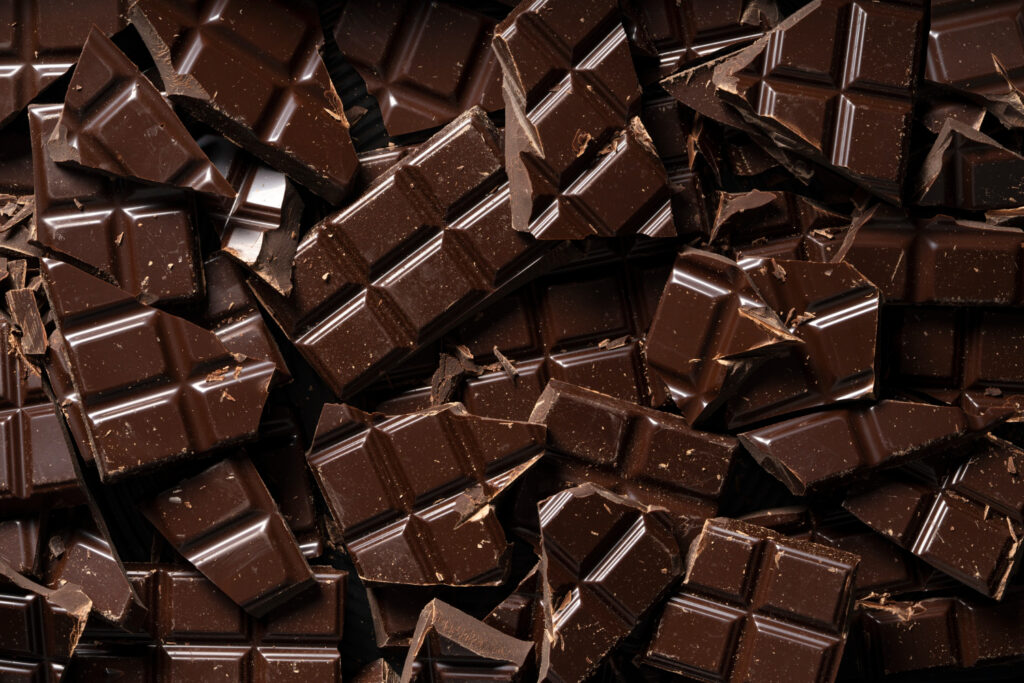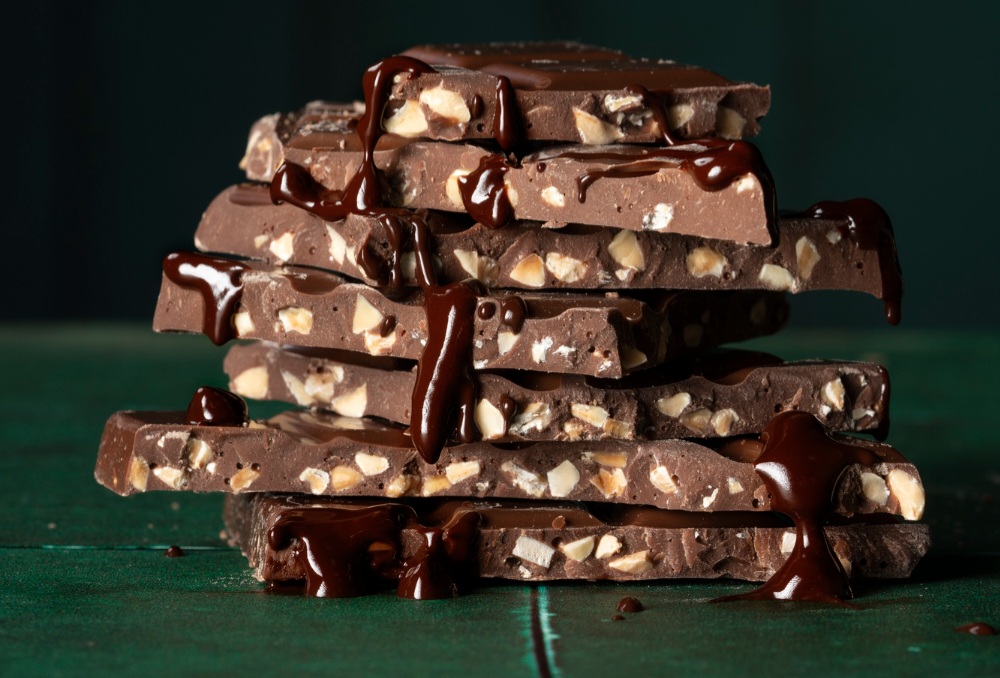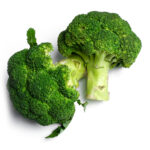
Dark chocolate is any chocolate containing at least 50% cocoa solids, cocoa butter, and sugar. Unlike milk chocolate, dark chocolate isn’t made with milk, though trace amounts may occur due to cross-contamination during manufacturing. Lower-quality dark chocolate might include oils, butter fats, and artificial flavors.
Humans have enjoyed chocolate since the Mayans first consumed it around 1500 B.C. Today, chocolate remains a popular treat, and we have even more reasons to enjoy dark chocolate.
Does Dark Chocolate Have Caffeine?
Yes, dark chocolate contains caffeine, and the more cocoa solids it has, the higher the caffeine content. A 3.5-ounce serving of dark chocolate with 70%-85% cocoa has about 80 milligrams of caffeine. By comparison, an 8-ounce cup of brewed coffee contains around 95 milligrams, and a 12-ounce can of caffeinated soda has between 40 and 55 milligrams. If you’re monitoring your caffeine intake, be mindful of how much dark chocolate you consume.
Is Dark Chocolate Vegan?
Cocoa is naturally vegan. However, some brands of dark chocolate may contain small amounts of dairy due to processing. Ingredients like whey, casein, and lactose are dairy products that might be present. Always check the label to ensure your dark chocolate is truly vegan.
Is Dark Chocolate Good for You?
Dark chocolate offers several health benefits due to its components, but it’s also high in calories, fat, and added sugar. Moderation is key. Dark chocolate has less sugar than milk chocolate, making it a better choice.
Dark Chocolate Health Benefits
The cocoa in dark chocolate is rich in flavanols, chemicals found in plants like the cacao tree. Flavan-3-ols, which give pure cocoa its bitter taste, have antioxidant and anti-inflammatory properties. These properties might help to:
- Protect Your Heart: Studies suggest dark chocolate may guard against cardiovascular disease, having anti-inflammatory effects, preventing blood clots, and lowering blood pressure. However, more research is needed to confirm these combined effects.
- Reduce Your Risk of Diabetes: The flavanols in cocoa are believed to increase insulin sensitivity, potentially reducing the risk of diabetes over time.
- Lower Blood Pressure: A review found that small amounts of dark chocolate can reduce blood pressure. Other research indicates it may improve blood vessel flexibility and function, and possibly prevent arteriosclerosis (artery stiffness due to plaque buildup).
- Improve Vision: One study noted improved vision in people who ate dark chocolate compared to those who ate milk chocolate. However, the effect’s duration and real-world applicability need further investigation.
Dark Chocolate Nutrition

For the most flavanols, choose chocolate that’s 70% or more dark. Dark chocolate contains a bit of fiber and several minerals, including:
- Magnesium
- Zinc
- Iron
- Phosphorus
- Copper
Nutrients Per Serving
A quarter cup of dark chocolate, about 1.5 ounces or 2 large squares, contains:
- 220 calories
- 2 grams of protein
- 13 grams of fat
- 24 grams of carbohydrates
- 3 grams of fiber
- 18 grams of sugar
- 3 milligrams of cholesterol
- 9 milligrams of sodium
Potential Risks
Due to its high sugar, fat, and calorie content, dark chocolate should be eaten in moderation. The American Heart Association suggests no more than 25-36 grams of added sugar per day, depending on your gender and size. One or two ounces per day can provide health benefits.
Dark Chocolate and Heavy Metals
Some dark chocolate bars contain lead and cadmium. A Consumer Reports study found that 23 of 28 bars tested had higher levels of these metals than the safe maximum daily dose. Even organic dark chocolate bars contained these metals, which are also found in other foods like sweet potatoes and spinach. These heavy metals can cause health problems ranging from stomach irritation to developmental delays in children and adults.
How to Use Dark Chocolate
Dark chocolate is popular in:
- Candy bars
- Cakes
- Hot drinks
- Puddings
- Cookies
For baking, melt dark chocolate slowly in the microwave in 30-second increments, stirring in between. Melting on the stove in a double boiler is effective but slower.
Adding Dark Chocolate to Your Diet
- Serve small squares with fresh fruit.
- Stir melted dark chocolate into oatmeal.
- Blend 1 or 2 tablespoons of dark chocolate with a frozen banana for a nondairy chocolate ice cream substitute.
Chocolate Alternatives
Despite its benefits, you might want other options
- Carob: A Mediterranean pod ground into a powder, carob is a popular chocolate substitute in baking. It’s low in fat, high in fiber, and caffeine-free.
- Cacao Nibs: Crushed cocoa beans with a bitter chocolatey taste, high in fiber and protein. They can be added to granola, smoothies, baked goods, or as a crunchy ice cream topping.











